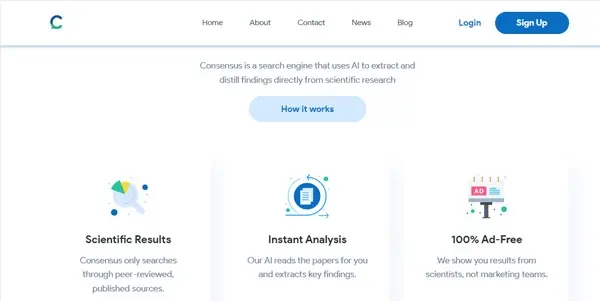Consensus

Get deep insight into scientific research from an AI-powered search engine
Consensus: An AI-Powered Search Engine for Scientific Research
Consensus is a free AI-powered search engine designed to provide deep insights into scientific research. It leverages the power of artificial intelligence to navigate the vast and often complex landscape of scholarly publications, making research more efficient and accessible. This article will explore its capabilities, applications, and how it stands up against similar tools.
What Consensus Does
Consensus acts as a sophisticated research assistant, going beyond simple keyword searches. Instead of merely returning a list of relevant articles, it analyzes the content of scientific papers to understand their core findings and relationships. This allows users to quickly identify key trends, controversies, and consensus opinions within a specific research area. It effectively synthesizes information from numerous sources, providing a concise and insightful overview that would otherwise require extensive manual review.
Main Features and Benefits
- Semantic Search: Consensus understands the meaning behind search queries, going beyond simple keyword matching. This leads to more relevant and insightful results.
- Content Summarization: It provides concise summaries of research papers, highlighting key findings and conclusions. This saves researchers significant time in sifting through lengthy articles.
- Trend Identification: Consensus can identify emerging trends and patterns within a research field, helping users stay abreast of the latest developments.
- Controversy Detection: The tool can highlight areas of ongoing debate or disagreement within the scientific literature.
- Cross-Referencing: It links related papers, providing a broader context for individual studies.
- Accessibility: Consensus is free to use, making advanced research tools accessible to a wider audience.
Benefits:
- Increased efficiency: Reduces the time spent searching and reviewing research papers.
- Improved understanding: Provides a synthesized overview of complex research areas.
- Enhanced discovery: Helps researchers identify relevant studies they might otherwise miss.
- Cost savings: The free access eliminates the need for expensive subscription-based research databases.
Use Cases and Applications
Consensus has broad applications across various fields, including:
- Academic Research: Students and professors can quickly gain an overview of a research area, identify relevant literature, and understand the current state of knowledge.
- Scientific Literature Reviews: Researchers can efficiently synthesize information for literature reviews and meta-analyses.
- Grant Proposal Writing: Consensus can help identify relevant research and support the justification for grant applications.
- Industry Research & Development: Companies can leverage Consensus to track relevant scientific advancements and inform their R&D strategies.
- Medical Professionals: Clinicians can stay updated on the latest research in their fields, improving patient care.
Comparison to Similar Tools
While several tools offer literature search capabilities, Consensus distinguishes itself through its AI-driven semantic understanding and synthesis of information. Tools like Google Scholar primarily focus on keyword matching and ranking, while PubMed provides a comprehensive database but lacks the AI-powered summarization and trend analysis offered by Consensus. Other AI-powered research assistants may focus on specific niches or require subscriptions. Consensus offers a free, comprehensive, and AI-enhanced approach.
Pricing Information
Consensus is currently free to use. There is no cost associated with accessing its features or using the platform.
Conclusion
Consensus offers a valuable and accessible tool for researchers across various disciplines. Its AI-powered features significantly streamline the research process, improving efficiency and leading to a deeper understanding of scientific literature. The free access democratizes access to powerful research tools, making it a valuable resource for students, academics, and professionals alike. As the platform continues to develop, its capabilities are likely to expand, further enhancing its utility for the scientific community.